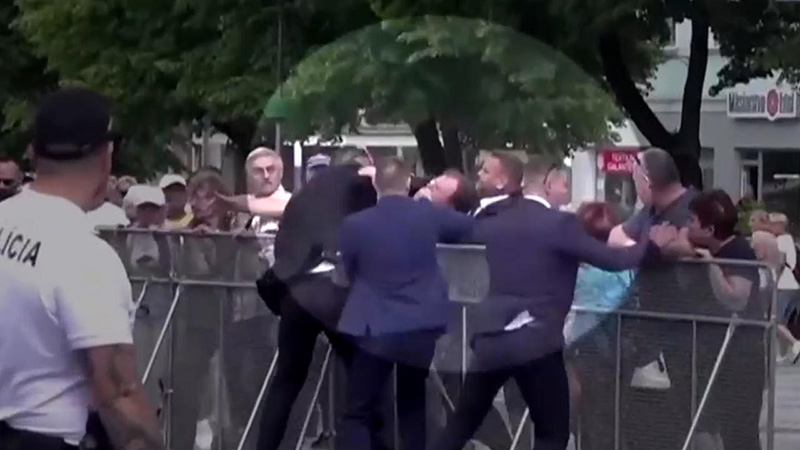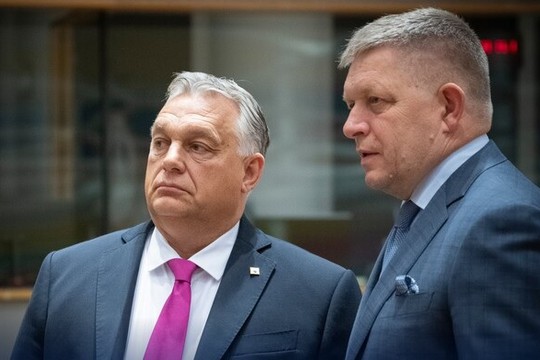Slovak Premier Robert Fico (right) and Hungarian Prime Minister Viktor Orban.
The attack on Slovak Premier Robert Fico, who has been pushing for peace in Ukraine, came amid active preparations by Western countries to directly participate in the Ukraine conflict, Hungarian Prime Minister Viktor Orban said, TASS informs.
The shooting in Slovakia “coincided with some other events indicating war preparations,” Orban told a morning show on Kossuth Radio. He referred to a recent visit to Kiev by US Secretary of State Antony Blinken, US plans to collect $100 bln in aid to Ukraine in the next five years and debates about sending Western troops to the former Soviet republic. “This gives me the willies,” he said.
According to Orban, NATO Secretary General Jens Stoltenberg is planning to visit Hungary in the run-up to elections to the European Parliament scheduled for June 6-9 to try and persuade Budapest to reconsider its stance. “Major global players are seeking to drag Hungary into war,” as has repeatedly happened throughout history, but this will not occur now, the Hungarian PM said with confidence. “Continued hostilities [in Ukraine] would mean continued suffering as the conflict can only be resolved at the negotiating table, and not on the battlefield. This is what is at stake ahead of the EU parliamentary election and this is our position today,” he said.
Commenting on the attempt on Fico’s life, Orban recounted that Slovakia was determined to negotiate peace in Ukraine, offering “a great deal of support” to Hungary which has consistently favored resolving the Ukraine conflict through talks. In Western Europe, only the Vatican, too, promotes peace, but the Holy See “does not vote in solving political issues” at EU meetings, Orban maintained.
“This means we should double down, and my work is getting harder in Brussels where I have to debate with politicians from the war camp,” Orban concluded.
Fico was attacked in the town of Handlova on May 15. The Slovak premier was shot multiple times in the chest, the abdomen and an extremity and doctors performed a five-hour operation on him. He is currently in serious but not life-threatening condition, the authorities said. The gunman, writer Juraj Cintula, has been detained, Slovak media reported. The attack is believed to be politically motivated as Cintula said he disagreed with the government.
 Security scrambled to tackle the shooter, 71-year-old Juraj Cintula from Levice, to the ground. An individual from within the crowd can be seen lunging forward, with a gun in hand as he begins shooting in the direction of the PM who is out of the camera frame.
Security scrambled to tackle the shooter, 71-year-old Juraj Cintula from Levice, to the ground. An individual from within the crowd can be seen lunging forward, with a gun in hand as he begins shooting in the direction of the PM who is out of the camera frame.
Photo: TV-clip
The assassinations of prime ministers are not a common occurrence in Europe, not even during the Cold War, writes Dimitris Konstantakopoulos, ex-advisor at the office of the Greek PM Andreas Papandreou on Arms Control and East-West relations.
The attempted assassination of the leftist and a critic of Western policy in Ukraine Prime Minister of Slovakia Robert Fico, is probably the most alarming of a plethora of indications we already have regarding both the rapid deterioration of the state of democracy in Europe and, also, of the intention of powerful western circles to escalate Western intervention in Ukraine.
We recall the dispatch to Kiev of weapons that can strike deep into Russian territory, Macron’s statements about sending French troops to Ukraine, the Polish Foreign Minister’s statement that there is no diplomatic solution to the Ukrainian problem, among many others. This is objectively a policy of preparing for world war, whether those who carry it out realize it or not, and such a policy of course presupposes the “cleansing” of the West of any “dissent”, as well as the violent repression of any protesters. And this preparation seems to include major terrorist acts like the blowing of the NordStream pipeline, an action reminiscent of the Gladio years.
Some were already quick to link the assassination attempt to Fico’s politics. We cannot, of course, be certain of anything at this stage of the investigation, and in particular of who is behind the attempt. But, if we don’t know who was behind the attempt, we do know who could hope to profit from it.
The fact is the Slovak Prime Minister stood out like a fly in the EU with his positions and policies, criticising NATO’s policy in Ukraine, and also expressing an ambition to resist the forces of global neoliberalism which, as he said, threatened his country. Regardless of who armed the would-be assassin’s hand, the attempt will serve to terrorize any international politician who wants to distance himself from America.
Just recently, the Hungarian PM has read in the Financial Times the project of Brussels to destroy the economy of his country if he insisted on vetoing EU’s “help” to Ukraine. Outside Europe, we have also the recent example of the popular Pakistani Prime Minister Imran Khan, whom the United States is accused of overthrowing
Fico suspended the supply of arms and ammunition to Ukraine, limited any Slovak aid to Kiev in the humanitarian sector and said that Putin would not be arrested if he visited Ukraine. He criticised the previous government’s policy of sending arms to Ukraine and then ordering new weapons to America, cutting social spending to pay for them and promised to revise the defence agreement with the US.
Fico described the conflict in Ukraine as a proxy war between the US and Russia, and called on NATO and the EU to “de-escalate” immediately and push for peace talks, calling for Ukraine to receive security guarantees from both Russia and NATO and to become a buffer zone between East and West. It should be noted that Fico has also criticised the war in Iraq and it was during his time that Slovak troops withdrew from that country.
By pursuing this policy, Fico became one of the few European leaders who make a policy in line with what their public opinion wants and not with what want from them the transnational centres that now control the majority of European politicians. Between 60% and 70% of Slovaks are in favour of good relations with Russia, while 66% believe that the United States is pushing the country into conflict with Russia.
Fico is also one of the few successful left-wing politicians at a time of defeats and degeneration of the left across Europe.
Of course, all this has made him a “black sheep” of the Western press, which has described his election as a serious geopolitical threat to NATO calling him a “populist” and a “nationalist”.
As we have already said, no one can be sure of what has happened. But assassinations of prime ministers are not a common occurrence in Europe, not even during the Cold War and the Gladio years.
It is probably a very serious indication of where we are and where we are going if the European people do not rise up to protect their rights and prevent the coming global War.
read more in our Telegram-channel https://t.me/The_International_Affairs

 10:19 19.05.2024 •
10:19 19.05.2024 •























